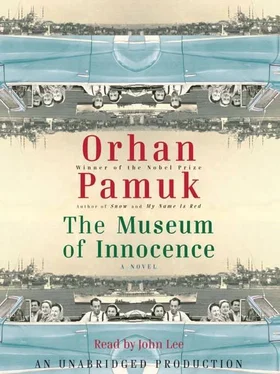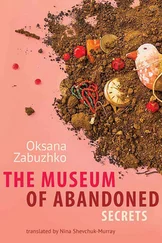They were very fond of Feridun, and because he held some of them in high esteem, had assisted some others, and wanted to ingratiate himself with the rest, he would go off to their tables, sitting with them for hours, leaving Füsun and me alone, though never happily on my part. When Feridun was with us, Füsun would address me as “Cousin Kemal,” only very rarely dropping this half-innocent pretense; if she did deign to speak to me sincerely, I read her change of register as a warning-about the men who came and went from our table, and her future life in the film world-that I ignored at my peril.
One evening after too much rakı , I found myself left alone with her again, and having tired of her aspirational fantasies and the pettiness of this milieu, I suddenly became convinced of the rightness of my next comment and of her receptiveness to it. “Take my arm, darling, let’s get up and leave this dreadful place together right now,” I said. “We could go to Paris, or Patagonia, to the other end of the world-it doesn’t matter so long as we forget all these people, and live happily ever after, just the two of us.”
“Cousin Kemal, how can you even say such a thing? Our lives are what they have become,” said Füsun.
After we’d been coming to the bar for several months, the drunken lot that gathered there every night (an “it” crowd in their own minds) didn’t bother us, having accepted Füsun as the young and beautiful bride and having pegged me with derisive suspicion as the “well-meaning idiot millionaire” who wanted to make an art film. But there were inevitably those who didn’t know us, or drunks who knew us but leered at Füsun anyway, or who had caught a glimpse of her from a distance while barhopping, or who nurtured an irrepressible longing to narrate their own life stories (this was an enormous crowd), and collectively they hardly left us alone. While I enjoyed it when a stranger joined us with a glass of raki in his hand, having taken me for Füsun’s husband, she would straightaway smile and correct them with an insistence that broke my heart every time, saying, “My husband is the fatso over there,” and emboldened the stranger to ignore me and attempt to make a pass at her.
Each attempt took a different form. Some claimed they were looking for a “dark-haired innocent-looking Turkish beauty” just like her to use in a photoroman; some would immediately offer her the lead in some new film on the prophet Abraham, headed imminently into production; some would gaze longingly into her eyes for hours saying nothing; while others would discourse on life’s little beauties and all the subtle wonders that no one paused to notice in this materialistic world, where only money mattered; then there were the ones who sat at remote tables reading the work of long-suffering imprisoned poets, poems about love, longing, and the nation; others from distant tables would either pay our tab or send us a plate of fruit. By the end of the winter we were frequenting these Beyoğlu haunts less, but every time we did go, we would inevitably see the same great hulking woman who often played the diabolical prison matron or the leading villainess’s bulky sidekick. She would invite Füsun to dance parties at her house, promising “lots of cultivated, well-schooled girls” like her. And there was always an old, squat little critic who wore bow ties and girded his enormous belly with suspenders; he would plant his ugly hand like a scorpion on Füsun’s shoulder, foretelling the “great fame” awaiting her, perhaps as the first Turkish actress to gain international renown, provided she gave careful consideration to every step she took.
Füsun would indeed give serious consideration to each and every film, photoroman , and modeling offer, however unsuitable or trivial; she would also remember the names of everyone she met, and in the case of film actors, no matter how obscure, she would shower them with outsize, even vulgar compliments, a want of proportion that I couldn’t help tracing back to her days as a shopgirl. Even as she tried to flatter and beguile everyone, she was also determined to achieve the often contradictory purpose of making herself seem interesting. Toward these ends she was ever more often pressing us to visit these places, and if I counseled against giving her phone number to everyone who made her an offer-“What would your father say?”-she would only snap at me that she knew what she was doing, even declaring that she needed options in the event that Feridun’s film failed to get made. I took deep offense at the implication and moved to another table, but then she would come over with Feridun and say, “Why don’t we three go out for supper, just like we did last summer?”
I had made two new friends among the hard-drinking film crowd of which I was slowly becoming a somewhat embarrassed fixture. One of them was a middle-aged actress named Sühendan Yıldız, who owed her fame as the “evil woman” entirely to her nose, which had been broken by one of Turkey ’s first cosmetic surgeons and reconstructed in a hideous new shape. The other was a character actor named Salih Sarılı, who having for years played authority figures like army officers and policemen, was now obliged to earn his keep by dubbing semi-legitimate domestic porn films, the absurdities of which enterprise he could be relied upon to recount in a chesty voice, often interrupted by a laugh and a hacking cough.
In a few years’ time I would discover that it was not just Salih Sarılı working in the domestic porn industry, but most of the actors we had befriended in the Pelür Bar, and this startled me as if I’d discovered that all my friends belonged to a secret society. Well-mannered middle-aged actresses and actors of strong types like Salih Bey would get by dubbing foreign films that were only moderately obscene, and during the sex scenes, moaning and screaming to suggest the details of the action that the film didn’t show. Most of these actors were married with children and admired for their gravitas; they would tell their friends that they had been forced to take on such work during the economic decline so as not to be entirely cut off from the film world, though at first they hid it from everyone, and especially their families. Even so, their ardent fans, particularly those in the provinces, would recognize their voices and write them letters of hatred or admiration. At the same time, far bolder, greedier actors and producers, most of them regulars at the Pelür, were involved in domestic productions that must go down in history as “the first Islamic porn films.” The “love scenes” in their films mixed sex with slapstick, as the gasping and moaning proceeded with ludicrous exaggeration, as the actors assumed all the positions that could be learned from European sex manuals bought on the black market, though all involved, male and female alike, would never remove their underpants.
At the Pelür, as Füsun headed off with Feridun, alighting at every table, meeting everyone she could, I would sit and listen to my two new middle-aged friends, more often the courteous Sühendan Hanım, dispense words of caution. I was, for example, to keep Füsun at all costs away from that producer over there, who looked respectable enough with his yellow tie, crisply ironed shirt, and little brush mustache, but whose greatest claim to fame was trapping women under thirty in his office above the Atlas Cinema where he had no qualms about locking the door and raping them, and afterward he would silence the crying girls with the offer of the lead in one of his films, which role, when the filming began, would turn out to be a bit part-that of the scheming German nanny who upsets the peaceful home of a rich Turkish man with a golden heart. I was to be likewise wary of Muzaffer the producer, also Feridun’s old boss, at whose side Feridun still spent so much time, laughing slavishly at every joke, hoping to win this man’s technical assistance for the art film. Not long ago, less than a fortnight, this scoundrel had been sharing a table with the owner of two medium-size production companies with whom he was in constant competition, and he had bet his rival a bottle of black market champagne that he could seduce Feridun’s wife within the month. (The films of that era offer copious examples of our fetish for that Western infidel luxury.) As I sat chatting with this renowned film star who had for so many years played the ordinary vixen (never the true she-devil), and who on account of the celebrity magazines was known to the entire Turkish nation as Conniving Sühendan, she would be knitting a tricolored woolen pullover for her beloved three-year-old grandson, and showing me the picture in Burda from which she was copying it. If anyone mocked her for sitting in the corner of the bar with balls of red, yellow, and navy blue wool on her lap, she would say, “At least I’m keeping busy while waiting for my next job, which is more than you drunks can say,” and if circumstances warranted she would discard her ladylike manners with some ease and launch into foul-mouthed invective.
Читать дальше












